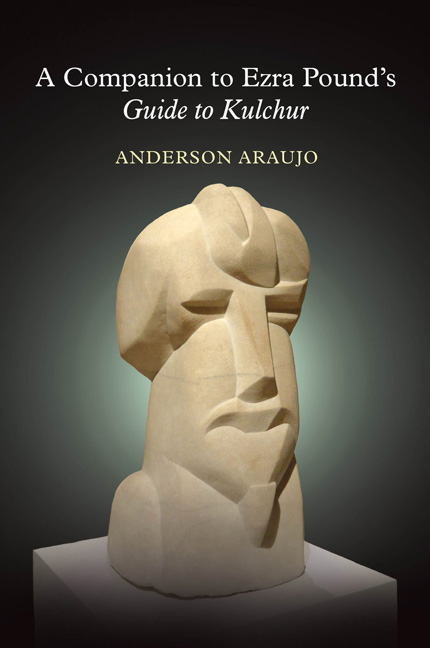Book contents
- Frontmatter
- Contents
- Acknowledgments
- Abbreviations
- Introduction
- Guide to Kulchur
- Part I
- Section I
- Section II
- Part II
- Section III
- Section IV
- Part III
- Section V
- Section VI
- Part IV
- Section VII
- Section VIII
- Section IV
- 38 Education Or Information
- 39 Neo-Platonicks Etc.
- 40 Losses
- 41 Odes: Risks
- 42 Great Bass: Part Two
- 43 Tone
- Part V
- Section X
- Section XI
- Part VI
- Section XII
- Section XIII
- Addenda: 1952
- Notes
- Index
42 - Great Bass: Part Two
from Section IV
- Frontmatter
- Contents
- Acknowledgments
- Abbreviations
- Introduction
- Guide to Kulchur
- Part I
- Section I
- Section II
- Part II
- Section III
- Section IV
- Part III
- Section V
- Section VI
- Part IV
- Section VII
- Section VIII
- Section IV
- 38 Education Or Information
- 39 Neo-Platonicks Etc.
- 40 Losses
- 41 Odes: Risks
- 42 Great Bass: Part Two
- 43 Tone
- Part V
- Section X
- Section XI
- Part VI
- Section XII
- Section XIII
- Addenda: 1952
- Notes
- Index
Summary
The 60, 72, or 84, or 120 per minute is a BASS, or basis … a ¼ tone too high: Pound's emphasis on “time-division” here is consistent with his theory of harmony in Antheil and the Treatise on Harmony. “The element most grossly omitted from treatises on harmony up to the present,” he affirms, “is the element of TIME. The question of the time-interval that must elapse between one sound and another if the two sounds are to produce a pleasing consonance or an interesting relation, has been avoided.” It is essential for the musician to gauge the “time-interval” properly by hearing both the time (duration) and pitch of a note. Pound enlists Dolmetsch to illustrate one of the ways in which this process can unfold in practice,
After Dolmetsch tunes a clavichord he has slightly to untune it. Why? That is to say, the proportion of the different notes remains correct but each note is sounded on two strings, and these must not be in absolute accord. He says the waves “cut” each other and ruin the resonance (cf. notes GK 71, 73).
revolutionary simpleton … chronological idiot: In Time and Western Man (1927), Wyndham Lewis writes, “Pound is not a vulgar humbug even in those purely propagandist activities, where, to my mind, he certainly handles humbug, but quite innocently, I believe. Pound is—that is my belief—a genuine naif. He is a sort of revolutionary simpleton!”3 In Blasting and Bombardiering (1937), Lewis paints himself as a “chronological idiot” with “no feeling for history,” attributing his obtuseness to “all that is historic and chronological” to his not being able to “see things as biography.”
- Type
- Chapter
- Information
- A Companion to Ezra Pound's Guide to KulcherGuide to Kulcher, pp. 255 - 256Publisher: Liverpool University PressPrint publication year: 2018



